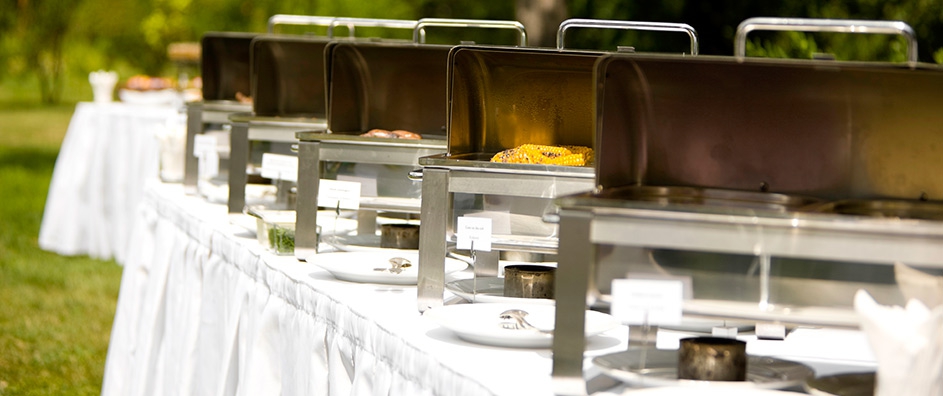The views expressed in our content reflect individual perspectives and do not represent the authoritative views of the Baha'i Faith.
My wife says we have a “mixed” marriage—she has Swedish heritage, and my family comes from Norway.
You’re probably saying what most people do: aren’t both of those countries right next to each other in Scandinavia? Yes, they are, and their closely-related cultures have many more similarities than they do differences. But my wife teasingly (I think) maintains the Swedes are culturally superior, more peaceful and more literate. I usually counter by saying that the Norwegians fought the Nazis when the Swedes didn’t; and that, um, the Vikings were mostly Swedes. All this cultural one-upsmanship has become a running joke between us, a fun way to satirize what seems silliest about those who tend to believe in cultural or racial superiority.
We both agree, though, on one bi-cultural constant: we love a good Scandinavian smorgasbord. During the time we’ve spent in Norway and Sweden, those meals—yum!—appealed to both of us, probably because of their many options and choices.
Have you ever eaten from a smorgasbord? It basically means “open table,” and offers a wide variety of foods, all offered buffet-style. You get to pick what you like, in other words, which pretty much guarantees you’ll end up eating a meal you really enjoy. (Depending on your desires and your relative level of self-control, however, it may not be a very healthy meal, especially if you choose six or seven desserts…)(Ask me how I know.)
I’ve thought a lot about smorgasbords as I’ve studied the “spiritual-but-not-religious” phenomena.
 That’s because we now have a spiritual smorgasbord in today’s world, a free-choice open table of religious options and outlooks. In one sense, that’s great—because unlike the old days, you don’t have to belong to your father’s religion any more, at least in most places. Instead, people have the freedom to choose their own beliefs. If they like a Catholic principle, for instance, but not the whole package, many people just select that one single principle to believe in, and reject the rest. To that principle they might add, smorgasbord-style, a few Buddhist teachings, a couple of Hindu ideas, and a philosophy from Plato or Aquinas or the Transcendentalists, and maybe a nice nostrum they saw on the Web. Those who think of themselves as spiritual but not religious—the so-called “SBNRs”—often tend to use this kind of “build-your-own-belief-system” approach. If it appeals to you, the thinking goes, put it on your plate.
That’s because we now have a spiritual smorgasbord in today’s world, a free-choice open table of religious options and outlooks. In one sense, that’s great—because unlike the old days, you don’t have to belong to your father’s religion any more, at least in most places. Instead, people have the freedom to choose their own beliefs. If they like a Catholic principle, for instance, but not the whole package, many people just select that one single principle to believe in, and reject the rest. To that principle they might add, smorgasbord-style, a few Buddhist teachings, a couple of Hindu ideas, and a philosophy from Plato or Aquinas or the Transcendentalists, and maybe a nice nostrum they saw on the Web. Those who think of themselves as spiritual but not religious—the so-called “SBNRs”—often tend to use this kind of “build-your-own-belief-system” approach. If it appeals to you, the thinking goes, put it on your plate.
You can already see the metaphorical and metaphysical problem here, I’m sure. We don’t always choose what’s healthiest and best for us. Left to our own devices, we sometimes select short-term pleasure or convenience over our longer-term well-being. (Please refer to the section above regarding desserts)
When we take a smorgasbord approach to our spirituality, we run the risk of missing the entire point of belief itself. Rather than adopting a holistic, unified spiritual practice designed to allow our souls to get the most beneficial permanent spiritual nutrition; we pick out the elements we like and ignore the ones we don’t. This can result in an unbalanced and unhealthy diet, a superficial, empty-calorie, high-sugar-content spirituality. Your delicious dinner might make you feel full now, but tomorrow you’ll get hungry again, and that same selection probably won’t feed your body’s—or your soul’s—true lifelong needs.
On the other hand, when we adopt and stick with one unified spiritual practice, the elements that may not immediately appeal to us wind up having a beneficial long-term effect on our souls. Rather than a mere smorgasbord, we sit down to a banquet fit for a king, designed by God for the organic, ongoing vitality and health of our spirituality. We get a balanced meal rather than an unhealthy series of snacks.
Here’s one example from my own experience: years ago, when I became a Baha’i, I really didn’t particularly understand, relate to or even have much inclination to practice a few of the Baha’i teachings. I couldn’t figure out, for example, why Baha’is prayed daily and fasted annually. Coming from my background as an agnostic, I didn’t have much of a taste yet for spiritual communion with God. I wanted to pray when I felt like it, and fasting was a hard discipline, something I really wasn’t used to.
Eventually, however, as I used those spiritual practices more and more regularly, I started to get it. They helped give me the strength to fight my own inner spiritual and psychological battles. They taught me detachment from my own desires. I learned, with daily prayer, how to meditatively calm myself and my emotions. Fasting taught me detachment and self-control. Today, I absolutely could not imagine going without those essential and much-loved parts of my inner spirituality. If I had taken a smorgasbord approach initially, I never would have had the opportunity to develop that part of myself. So I learned to accept and be grateful for the entire banquet, rather than just the dishes I liked:
Man must live in a state of prayer. The most blessed condition is the condition of prayer and supplication. Prayer is conversation with God. The greatest attainment or the sweetest state is none other than conversation with God. It creates spirituality, creates mindfulness and celestial feelings, begets new attractions of the Kingdom and engenders the susceptibilities of the higher intelligence. – Abdu’l-Baha, Star of the West, Volume 5, p. 41.
Fasting is the cause of awakening man. The heart becomes tender and the spirituality of man increases. This is produced by the fact that man’s thoughts will be confined to the commemoration of God, and through this awakening and stimulation surely ideal advancements follow. – Ibid., Volume 3, p. 305.
In the world many banquets, assemblages and meetings have been organized, but those gatherings have been commercial, political, educational or social in their purpose and motive… But — praise be to God! — this banquet and this assemblage are for none other purpose than love, for the purpose of announcing the divine Kingdom, for the manifestation of the ineffable traces of God, for reflecting the effulgences of the Kingdom of God, for binding hearts together, for service to the world of humanity, for the promulgation of humanitarian and altruistic realities, for the advancement and advocating of international peace, for the illumination of the whole world. – Abdu’l-Baha, The Promulgation of Universal Peace, p. 418.
The gates of the Kingdom are opened wide, and every favoured soul is seated at the banquet table of the Lord, receiving his portion of that heavenly feast. Praised be God, thou too art present at this table, taking thy share of the bountiful food of heaven. – Abdu’l-Baha, Selections from the Writings of Abdu’l-Baha, p. 57.
Next: Two Dimensions to Every Tradition: Temporal and Eternal
















Comments
Sign in or create an account
Continue with Googleor